2018高考英语作文预测:(23)留学低龄化利弊
- 格式:doc
- 大小:19.50 KB
- 文档页数:1
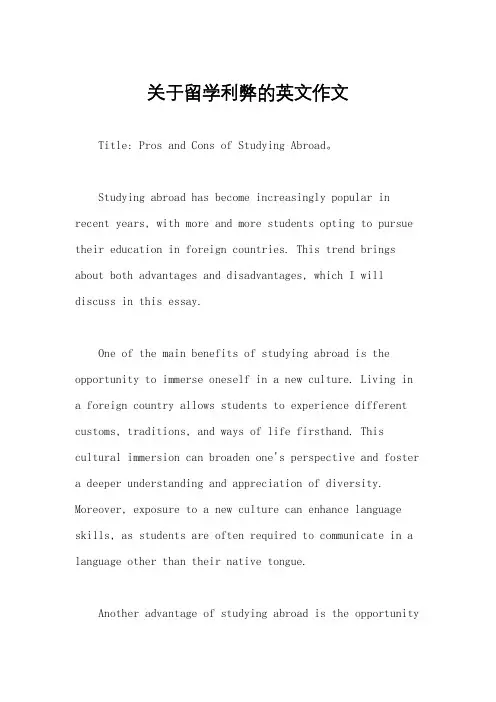
关于留学利弊的英文作文Title: Pros and Cons of Studying Abroad。
Studying abroad has become increasingly popular in recent years, with more and more students opting to pursue their education in foreign countries. This trend brings about both advantages and disadvantages, which I will discuss in this essay.One of the main benefits of studying abroad is the opportunity to immerse oneself in a new culture. Living in a foreign country allows students to experience different customs, traditions, and ways of life firsthand. This cultural immersion can broaden one's perspective and foster a deeper understanding and appreciation of diversity. Moreover, exposure to a new culture can enhance language skills, as students are often required to communicate in a language other than their native tongue.Another advantage of studying abroad is the opportunityfor personal growth and development. Moving to a newcountry requires students to step out of their comfortzones and adapt to unfamiliar environments. This experience fosters independence, resilience, and problem-solvingskills, which are valuable traits that can benefit individuals throughout their lives. Additionally, studying abroad provides opportunities for self-discovery and self-reflection, as students navigate new challenges and forge their own paths.Furthermore, studying abroad can open doors to career opportunities. Many employers value the skills and experiences gained from living and studying in a foreign country. International experience demonstrates adaptability, cultural competency, and global awareness, qualities that are increasingly important in today's interconnected world. Additionally, studying abroad may provide access to unique academic programs, research opportunities, and internships that may not be available in one's home country.Despite these advantages, studying abroad also presents challenges and drawbacks. One potential disadvantage is thefinancial cost. Tuition fees, living expenses, travel costs, and other associated expenses can add up quickly, making studying abroad prohibitively expensive for some students. Additionally, currency exchange rates and fluctuating economies can further impact the affordability of studyingin certain countries.Another challenge of studying abroad is the potentialfor homesickness and cultural adjustment issues. Being away from family and friends can be difficult, especially for prolonged periods. Moreover, adapting to a new culture, language, and educational system can be overwhelming and stressful for some students. Feelings of isolation, loneliness, and cultural shock are not uncommon among international students.Furthermore, studying abroad may pose academic challenges. Differences in teaching styles, grading systems, and academic expectations can be confusing and challenging for students who are accustomed to a different educational system. Additionally, language barriers may hinder academic performance and communication with professors and peers.In conclusion, studying abroad offers a myriad of opportunities for personal, academic, and professional growth. From cultural immersion and language acquisition to career advancement and personal development, the benefits of studying abroad are vast. However, it is essential to consider the potential challenges and drawbacks, such as financial costs, cultural adjustment issues, and academic challenges. Ultimately, the decision to study abroad should be carefully weighed, taking into account individual goals, preferences, and circumstances.。
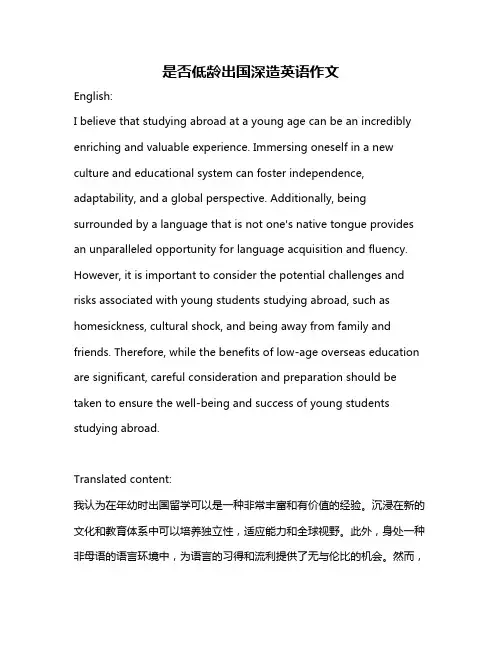
是否低龄出国深造英语作文English:I believe that studying abroad at a young age can be an incredibly enriching and valuable experience. Immersing oneself in a new culture and educational system can foster independence, adaptability, and a global perspective. Additionally, being surrounded by a language that is not one's native tongue provides an unparalleled opportunity for language acquisition and fluency. However, it is important to consider the potential challenges and risks associated with young students studying abroad, such as homesickness, cultural shock, and being away from family and friends. Therefore, while the benefits of low-age overseas education are significant, careful consideration and preparation should be taken to ensure the well-being and success of young students studying abroad.Translated content:我认为在年幼时出国留学可以是一种非常丰富和有价值的经验。
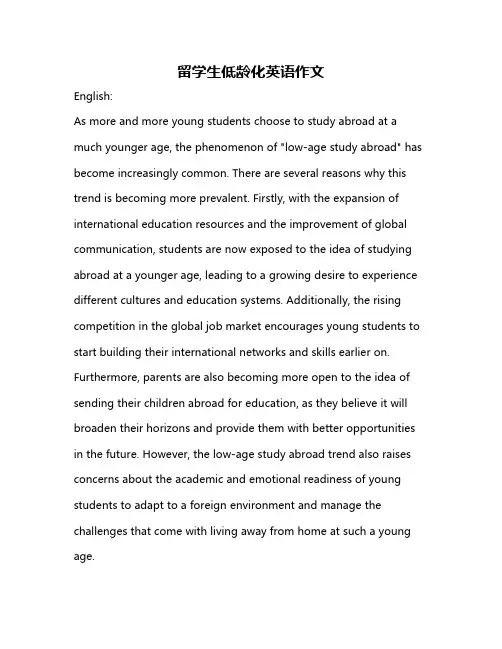
留学生低龄化英语作文English:As more and more young students choose to study abroad at a much younger age, the phenomenon of "low-age study abroad" has become increasingly common. There are several reasons why this trend is becoming more prevalent. Firstly, with the expansion of international education resources and the improvement of global communication, students are now exposed to the idea of studying abroad at a younger age, leading to a growing desire to experience different cultures and education systems. Additionally, the rising competition in the global job market encourages young students to start building their international networks and skills earlier on. Furthermore, parents are also becoming more open to the idea of sending their children abroad for education, as they believe it will broaden their horizons and provide them with better opportunities in the future. However, the low-age study abroad trend also raises concerns about the academic and emotional readiness of young students to adapt to a foreign environment and manage the challenges that come with living away from home at such a young age.Translated content:随着越来越多的年轻学生选择在更年轻的年龄去国外留学,低龄留学这一现象变得越来越普遍。

留学利弊作文模板英文英文:Studying abroad has become increasingly popular among young people in recent years. However, it is still a controversial topic whether studying abroad has more advantages or disadvantages. In my opinion, studying abroad can bring both benefits and drawbacks.On the one hand, studying abroad can broaden one's horizons and enrich one's experience. Living in a foreign country, students can learn a new language, adapt to a new culture, and make friends from all over the world. These experiences can help students become more open-minded, independent, and confident. Moreover, studying abroad can also provide better academic opportunities. For example, some universities in developed countries have advanced facilities and resources, which can offer students a better learning environment and access to cutting-edge research.On the other hand, studying abroad can be challenging and stressful. Students may face difficulties in adapting to a new environment, such as language barriers, cultural shock, and homesickness. They may also encounter financial and practical problems, such as high tuition fees, visa issues, and accommodation. Furthermore, studying abroad may also lead to a sense of disconnection from one's ownculture and identity. Some students may feel lost or confused about their values and beliefs, and struggle to find a sense of belonging in a foreign land.In conclusion, studying abroad can be a rewarding but challenging experience. It depends on the individual's goals, personality, and circumstances. For me, I believe that studying abroad can provide me with valuable opportunities to learn and grow, but I also need to be prepared for the difficulties and uncertainties that may come along the way.中文:近年来,留学已经成为年轻人越来越流行的选择。
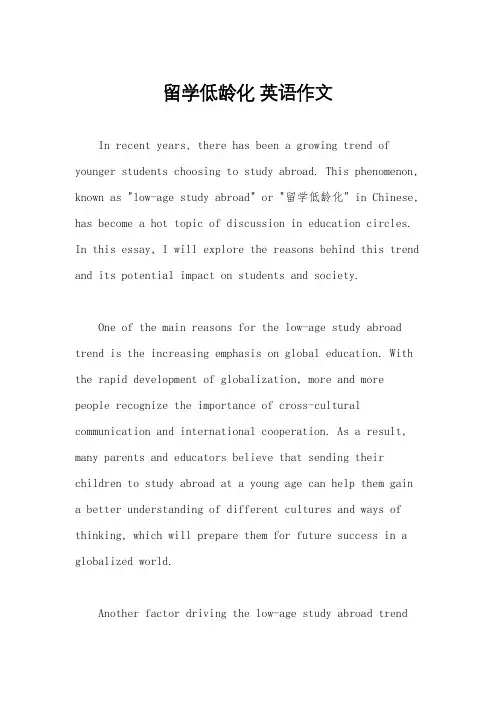
留学低龄化英语作文In recent years, there has been a growing trend of younger students choosing to study abroad. This phenomenon, known as "low-age study abroad" or "留学低龄化" in Chinese, has become a hot topic of discussion in education circles. In this essay, I will explore the reasons behind this trend and its potential impact on students and society.One of the main reasons for the low-age study abroad trend is the increasing emphasis on global education. With the rapid development of globalization, more and more people recognize the importance of cross-cultural communication and international cooperation. As a result, many parents and educators believe that sending their children to study abroad at a young age can help them gain a better understanding of different cultures and ways of thinking, which will prepare them for future success in a globalized world.Another factor driving the low-age study abroad trendis the desire for better educational opportunities. Many parents believe that the education system in their home country is too rigid and exam-oriented, and that studying abroad can provide their children with a more diverse and innovative learning environment. In addition, some families may be motivated by the prestige associated with attending a top-ranked foreign university.However, there are also concerns about the potential negative effects of low-age study abroad. One of the most significant issues is the impact on social and emotional development. Young students who study abroad may face challenges such as homesickness, cultural shock, and language barriers, which can be overwhelming and stressful. In addition, they may miss out on important social and emotional experiences that are crucial for their development, such as forming close relationships with peers and participating in extracurricular activities.Furthermore, low-age study abroad can also exacerbate social inequality. Only a small percentage of families can afford the high tuition fees and living expenses associatedwith studying abroad, which means that low-income families are often unable to provide their children with this opportunity. This can further widen the gap between the rich and poor, and limit social mobility.In conclusion, the low-age study abroad trend reflects the increasing importance of global education and the desire for better educational opportunities. While there are potential benefits to studying abroad at a young age, it is important to consider the potential negative effects on social and emotional development, as well as the impact on social inequality. As educators and policymakers, we must strive to create a more equitable and inclusive education system that provides all students with the opportunity to succeed, regardless of their background or financial situation.。
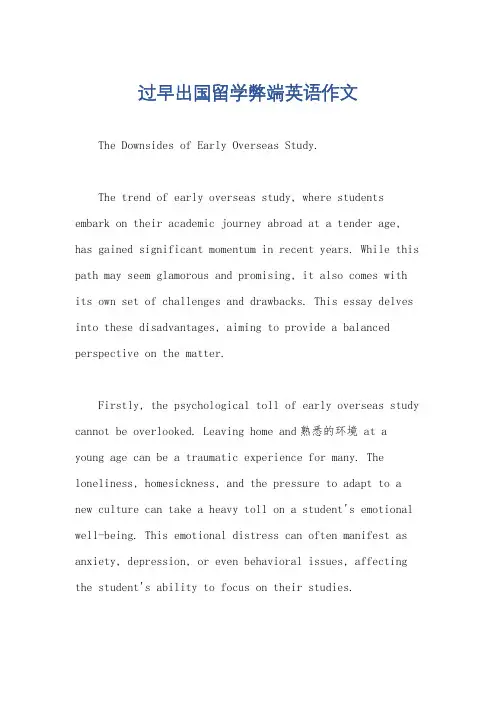
过早出国留学弊端英语作文The Downsides of Early Overseas Study.The trend of early overseas study, where students embark on their academic journey abroad at a tender age, has gained significant momentum in recent years. While this path may seem glamorous and promising, it also comes with its own set of challenges and drawbacks. This essay delves into these disadvantages, aiming to provide a balanced perspective on the matter.Firstly, the psychological toll of early overseas study cannot be overlooked. Leaving home and熟悉的环境 at a young age can be a traumatic experience for many. The loneliness, homesickness, and the pressure to adapt to a new culture can take a heavy toll on a student's emotional well-being. This emotional distress can often manifest as anxiety, depression, or even behavioral issues, affecting the student's ability to focus on their studies.Moreover, the social aspect of early overseas study is not always rosy. Young students may find themselvesisolated from their peers, as they struggle to make friends and fit into the social fabric of their new environment. This social isolation can lead to feelings of inadequacy and exclusion, further compounding the emotional challenges they already face.Academically, early overseas study may not always yield the desired results. The transition to a new educational system, curriculum, and language can be daunting for students who are not fully prepared. This can lead to academic struggles, poor performance, and even a sense of failure, which can have a long-term impact on the student's confidence and motivation.Additionally, the financial implications of early overseas study are significant. The cost of education, living expenses, and the added expenses of travel and visas can be a heavy burden for families. This financial pressure can lead to feelings of guilt and obligation on the part of the student, affecting their ability to enjoy theireducational experience.Furthermore, the lack of cultural understanding and language proficiency can be a major hindrance for young students abroad. Navigating a new culture, understanding social norms, and communicating effectively can be challenging, especially for those who are not fluent in the local language. This cultural and linguistic gap can lead to misunderstandings, awkward situations, and even conflicts, affecting the student's integration into the new environment.Moreover, the rush to send children abroad at a young age can sometimes lead to a neglect of other important aspects of their development. Family time, extracurricular activities, and the support of a local community are all crucial for the overall growth and well-being of children. By sending them abroad too early, parents may miss out on these important milestones in their child's life, potentially leading to a sense of regret and missed opportunities.In conclusion, while early overseas study may offer some advantages, such as exposure to a different culture and improved language skills, it also comes with a number of significant drawbacks. These include psychological distress, social isolation, academic struggles, financial pressure, cultural and linguistic gaps, and neglect of other important aspects of development. Therefore, it is crucial for parents and students to carefully consider all the factors involved before making the decision to pursue early overseas study.。
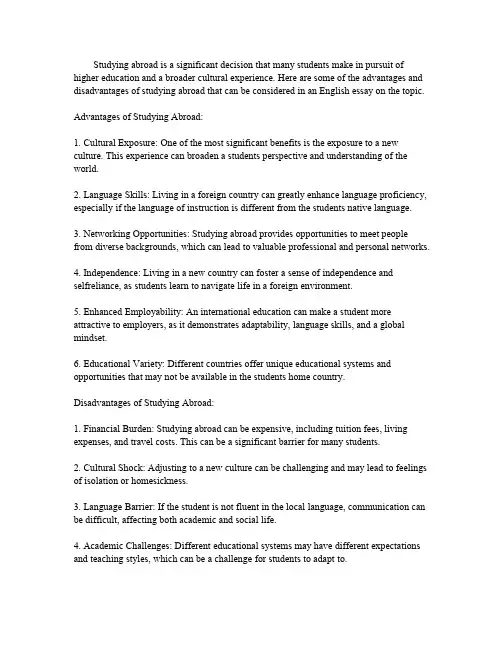
Studying abroad is a significant decision that many students make in pursuit of higher education and a broader cultural experience.Here are some of the advantages and disadvantages of studying abroad that can be considered in an English essay on the topic.Advantages of Studying Abroad:1.Cultural Exposure:One of the most significant benefits is the exposure to a new culture.This experience can broaden a students perspective and understanding of the world.nguage Skills:Living in a foreign country can greatly enhance language proficiency, especially if the language of instruction is different from the students native language.working Opportunities:Studying abroad provides opportunities to meet people from diverse backgrounds,which can lead to valuable professional and personal networks.4.Independence:Living in a new country can foster a sense of independence and selfreliance,as students learn to navigate life in a foreign environment.5.Enhanced Employability:An international education can make a student more attractive to employers,as it demonstrates adaptability,language skills,and a global mindset.cational Variety:Different countries offer unique educational systems and opportunities that may not be available in the students home country.Disadvantages of Studying Abroad:1.Financial Burden:Studying abroad can be expensive,including tuition fees,living expenses,and travel costs.This can be a significant barrier for many students.2.Cultural Shock:Adjusting to a new culture can be challenging and may lead to feelings of isolation or homesickness.nguage Barrier:If the student is not fluent in the local language,communication can be difficult,affecting both academic and social life.4.Academic Challenges:Different educational systems may have different expectations and teaching styles,which can be a challenge for students to adapt to.5.Limited Support System:Being away from family and friends can be emotionally challenging,and students may not have the same support system they would have at home.6.Career Uncertainty:Some students may face uncertainty regarding their career prospects upon returning to their home country,especially if their international qualifications are not recognized or valued.In conclusion,while studying abroad offers numerous benefits such as cultural enrichment,language acquisition,and personal growth,it also comes with challenges like financial strain and potential career uncertainties.Students should carefully weigh these factors before making the decision to study in a foreign country.。
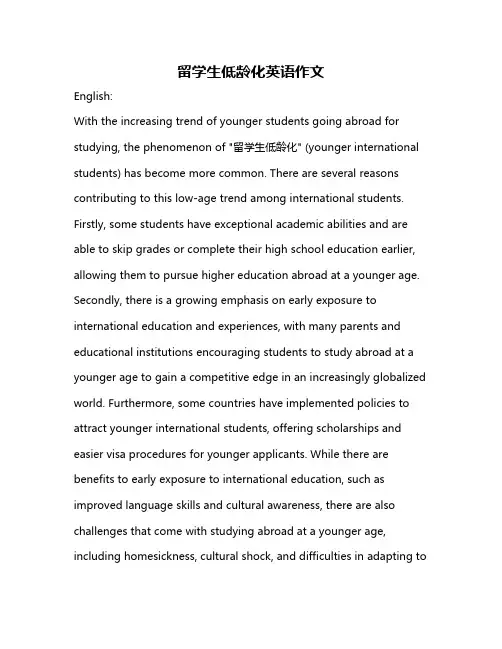
留学生低龄化英语作文English:With the increasing trend of younger students going abroad for studying, the phenomenon of "留学生低龄化" (younger international students) has become more common. There are several reasons contributing to this low-age trend among international students. Firstly, some students have exceptional academic abilities and are able to skip grades or complete their high school education earlier, allowing them to pursue higher education abroad at a younger age. Secondly, there is a growing emphasis on early exposure to international education and experiences, with many parents and educational institutions encouraging students to study abroad at a younger age to gain a competitive edge in an increasingly globalized world. Furthermore, some countries have implemented policies to attract younger international students, offering scholarships and easier visa procedures for younger applicants. While there are benefits to early exposure to international education, such as improved language skills and cultural awareness, there are also challenges that come with studying abroad at a younger age, including homesickness, cultural shock, and difficulties in adapting toa new academic environment without the maturity and life experience of older students.中文翻译:随着越来越多年轻学生选择出国留学,"留学生低龄化"现象变得更加普遍。
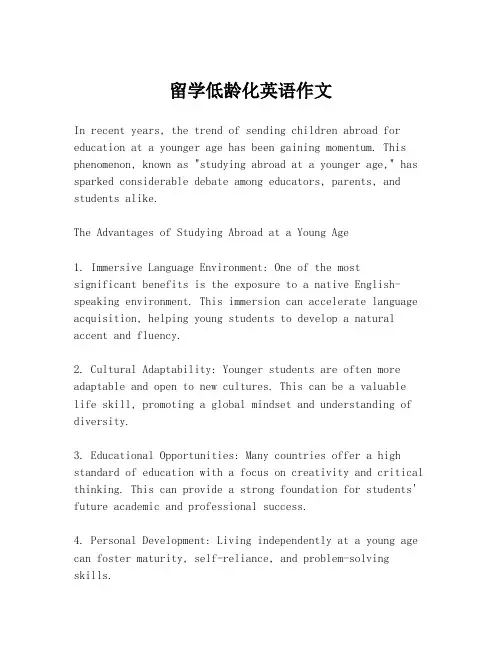
留学低龄化英语作文In recent years, the trend of sending children abroad for education at a younger age has been gaining momentum. This phenomenon, known as "studying abroad at a younger age," has sparked considerable debate among educators, parents, and students alike.The Advantages of Studying Abroad at a Young Age1. Immersive Language Environment: One of the mostsignificant benefits is the exposure to a native English-speaking environment. This immersion can accelerate language acquisition, helping young students to develop a natural accent and fluency.2. Cultural Adaptability: Younger students are often more adaptable and open to new cultures. This can be a valuable life skill, promoting a global mindset and understanding of diversity.3. Educational Opportunities: Many countries offer a high standard of education with a focus on creativity and critical thinking. This can provide a strong foundation for students' future academic and professional success.4. Personal Development: Living independently at a young age can foster maturity, self-reliance, and problem-solving skills.Challenges of Studying Abroad at a Young Age1. Homesickness and Emotional Challenges: Being away from family and friends can be emotionally challenging for young students, potentially leading to homesickness and loneliness.2. Cultural Shock: Adjusting to a new culture can be difficult, and younger students may struggle with understanding and adapting to new social norms and expectations.3. Academic Pressure: The academic standards and teaching methods may differ significantly from what students are used to, which can be overwhelming.4. Financial Burden: Studying abroad can be expensive, and the financial burden can be a significant consideration for many families.ConclusionWhile studying abroad at a younger age offers numerous advantages, it is essential to weigh these against the potential challenges. Parents and students should consider the child's emotional readiness, academic goals, and the family's financial situation before making such a decision. Ultimately, the decision should be based on what is best for the child's overall development and future prospects.。
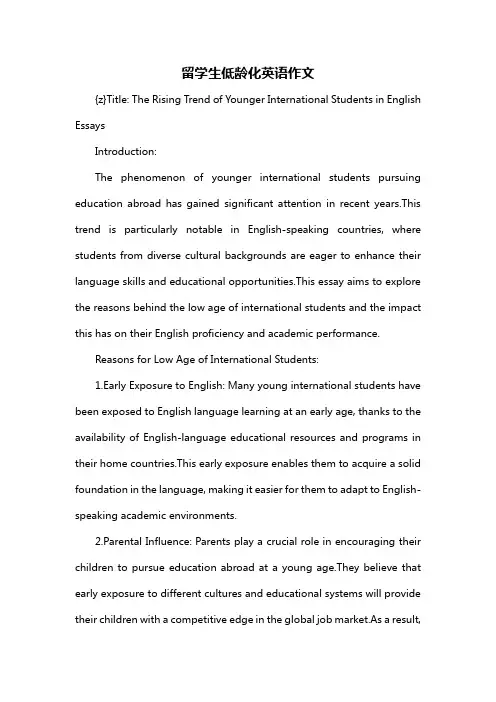
留学生低龄化英语作文{z}Title: The Rising Trend of Younger International Students in English EssaysIntroduction:The phenomenon of younger international students pursuing education abroad has gained significant attention in recent years.This trend is particularly notable in English-speaking countries, where students from diverse cultural backgrounds are eager to enhance their language skills and educational opportunities.This essay aims to explore the reasons behind the low age of international students and the impact this has on their English proficiency and academic performance.Reasons for Low Age of International Students:1.Early Exposure to English: Many young international students have been exposed to English language learning at an early age, thanks to the availability of English-language educational resources and programs in their home countries.This early exposure enables them to acquire a solid foundation in the language, making it easier for them to adapt to English-speaking academic environments.2.Parental Influence: Parents play a crucial role in encouraging their children to pursue education abroad at a young age.They believe that early exposure to different cultures and educational systems will provide their children with a competitive edge in the global job market.As a result,more parents are willing to send their children to English-speaking countries for education.3.Access to Quality Education: English-speaking countries are known for their excellent educational institutions and resources.Many young international students are attracted to these countries to benefit from the high-quality education system, which offers a wide range of academic and extracurricular opportunities.Impact on English Proficiency:nguage Acquisition: Younger students have a natural ability to learn languages quickly.Their minds are more adaptable, allowing them to pick up English faster than older students.This early language acquisition is beneficial for international students, as it enables them to communicate effectively and excel academically in English-speaking environments.2.Cultural Adaptation: Younger students are more open to embracing new cultures.Their adaptability and curiosity help them integrate into the host country"s society more easily.This cultural immersion not only enhances their language skills but also broadens their horizons and fosters a global mindset.3.Academic Performance: Younger international students often demonstrate high academic performance due to their eagerness to learn and excel.Their strong work ethic and dedication contribute to theirsuccess in English-speaking educational systems.Challenges and Supportive Measures:1.Separation from Family: Younger students may face challenges related to being away from their families.It is essential for educational institutions to provide a supportive environment that helps them adjust to their new surroundings and feel emotionally supported.2.Homesickness and Cultural Shock: The initial period of living in a new country can be daunting for younger students.Schools should offer cultural adaptation programs and counseling services to help them cope with homesickness and cultural shock.nguage Barrier: Although younger students have the advantage of quick language acquisition, they may still encounter difficulties with certain aspects of the English language.Providing additional language support and resources can help them overcome these challenges and improve their overall language proficiency.Conclusion:The low age of international students in English-speaking countries is a significant trend that is likely to continue growing.These young students bring energy, curiosity, and a passion for learning to their academic pursuits.With the right support and resources, they can thrive academically, culturally, and linguistically, contributing to the diverse and vibrant educational landscape of English-speaking countries.。
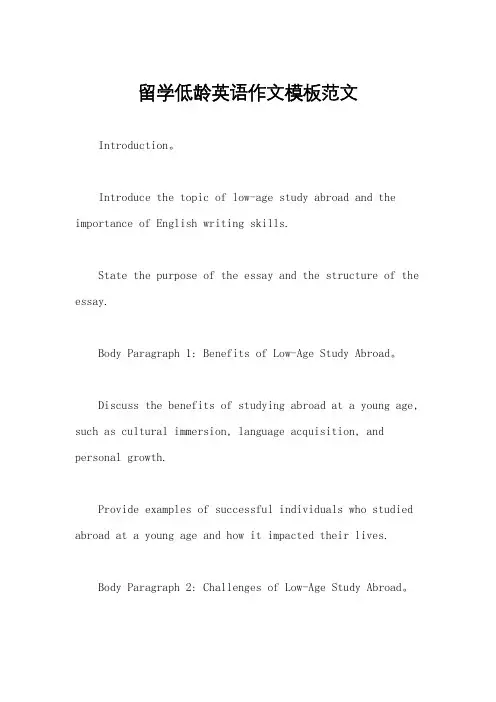
留学低龄英语作文模板范文Introduction。
Introduce the topic of low-age study abroad and the importance of English writing skills.State the purpose of the essay and the structure of the essay.Body Paragraph 1: Benefits of Low-Age Study Abroad。
Discuss the benefits of studying abroad at a young age, such as cultural immersion, language acquisition, and personal growth.Provide examples of successful individuals who studied abroad at a young age and how it impacted their lives.Body Paragraph 2: Challenges of Low-Age Study Abroad。
Discuss the challenges that young students may face when studying abroad, such as homesickness, language barriers, and academic pressure.Provide tips and strategies for overcoming these challenges, such as staying connected with family and friends, seeking support from teachers and peers, and maintaining a healthy balance between study and leisure.Body Paragraph 3: Importance of English Writing Skills。
留学低龄化英文作文下载温馨提示:该文档是我店铺精心编制而成,希望大家下载以后,能够帮助大家解决实际的问题。
文档下载后可定制随意修改,请根据实际需要进行相应的调整和使用,谢谢!并且,本店铺为大家提供各种各样类型的实用资料,如教育随笔、日记赏析、句子摘抄、古诗大全、经典美文、话题作文、工作总结、词语解析、文案摘录、其他资料等等,如想了解不同资料格式和写法,敬请关注!Download tips: This document is carefully compiled by theeditor. I hope that after you download them,they can help yousolve practical problems. The document can be customized andmodified after downloading,please adjust and use it according toactual needs, thank you!In addition, our shop provides you with various types ofpractical materials,such as educational essays, diaryappreciation,sentence excerpts,ancient poems,classic articles,topic composition,work summary,word parsing,copyexcerpts,other materials and so on,want to know different data formats andwriting methods,please pay attention!Nowadays, more and more young kids are going abroad to study. It's kind of crazy. You see these little ones leaving their families and going to a whole new place. It's a big decision.Some say it's good for them to experience different cultures early on. They can learn new languages easier. But then again, it can be really hard for them to be away from home at such a young age.There are also concerns about how they'll adapt. Will they be able to handle the pressure? And what about their emotional well-being? It's not an easy thing.Another thing is that it costs a lot of money. Not every family can afford it. But still, many parents are willing to take the risk and send their kids abroad. It's quite a trend.。
The Pros and Cons of Minors StudyingAbroadIn recent years, the trend of minors studying abroad has gained increasing popularity. While some view this as a valuable opportunity for personal growth and cultural exposure, others express concerns regarding the potential challenges and risks involved. This essay aims to explore both the benefits and drawbacks of minors studying abroad, offering a comprehensive analysis of this complex topic.On the positive side, studying abroad during adolescence can provide minors with a unique cultural experience. Exposure to different cultures and ways of life can broaden their horizons, enhance their understanding of the world, and foster a more inclusive mindset. Additionally, the opportunity to learn a new language in a native-speaking environment is invaluable, often leading to improved language skills and fluency.Moreover, studying abroad can foster independence and self-reliance. Minors who study abroad are often forced to navigate new environments and cultures independently, which can foster a sense of self-confidence and resilience. Theylearn to manage their own daily lives, handle unexpected situations, and develop problem-solving skills that are crucial for personal growth.However, there are also significant drawbacks to minors studying abroad. The primary concern is the potential impact on their psychological well-being. Being away from family and friends, coupled with the challenges of adapting to a new culture and educational system, can be emotionally draining. This may lead to feelings of loneliness, homesickness, and stress, which can have negative impacts on their academic performance and overall well-being.Additionally, minors may lack the maturity and life experience to handle the complexities of living in a foreign country. They may find it difficult to navigate cultural differences, understand social norms, and make informed decisions about their personal safety and well-being. This can pose significant risks, particularly in countries with different legal systems and cultural practices.Furthermore, the cost of studying abroad can be prohibitively expensive for many families. The financialburden can be significant, and may require significant sacrifices in other areas of the family's budget. This can add to the stress and anxiety already associated with the minor's adjustment to a new environment.In conclusion, the decision to send minors abroad for education is a complex one that requires careful consideration. While the benefits of cultural exposure, language acquisition, and personal growth are significant, the potential psychological, social, and financial challenges must also be taken into account. It is crucial for parents and guardians to weigh these factors carefully and make an informed decision based on the individual needs and circumstances of the minor.**未成年人留学的利与弊**近年来,未成年人留学的趋势日益流行。
Low-Age Overseas Education: Opportunitiesand ChallengesIn recent years, the trend of low-age overseas education has been gaining increasing popularity among Chinese families. Many parents are eager to send their young children abroad to pursue better educational opportunities and broaden their horizons. While this trend offers numerous advantages, it also poses significant challenges that parents and children alike need tocarefully consider.One of the primary benefits of low-age overseas education is the access to superior academic resources. Foreign educational institutions, especially those in developed countries, often boast advanced curricula, state-of-the-art facilities, and highly qualified teachers. These factors can provide children with a more comprehensive and rigorous education, fostering their intellectual and academic development.Moreover, studying abroad at a young age can help children develop cross-cultural skills and a global perspective. Living in a foreign country and interactingwith people of different backgrounds and cultures can enhance children's understanding of the world and their ability to adapt to diverse environments. This, in turn, can foster their creativity, innovation, and problem-solving skills, making them more competitive in the globalized world.However, low-age overseas education is not without its challenges. The most significant one is the emotional and psychological impact on children. Leaving their familiar surroundings, families, and friends can be emotionally traumatizing for young children. They may feel lonely, anxious, or even depressed, which can have negative effects on their mental health and academic performance.Another challenge is the language barrier. Children who are not proficient in the language of the host country may find it difficult to communicate and integrate into the local society. This can lead to social isolation and hinder their ability to make friends and participate in school activities.Moreover, parents also need to consider the financial implications of low-age overseas education. Sendingchildren to study abroad, especially to developed countries, can be an expensive endeavor. The costs of tuition, accommodation, travel, and other expenses can besignificant, putting a strain on the family's financial resources.In conclusion, low-age overseas education presents both opportunities and challenges. While it can provide children with superior academic resources and cross-cultural experiences, it also comes with emotional, psychological, linguistic, and financial challenges. Therefore, parents should carefully consider these factors and make informed decisions based on their child's needs, abilities, and personal preferences.**低龄留学:机遇与挑战**近年来,低龄留学在中国家庭中越来越受欢迎。
Lowage study abroad has become a trend in recent years,with many parents choosing to send their children overseas for education at a younger age.This approach has both advantages and disadvantages,and its important to consider the implications carefully.Advantages of Lowage Study Abroad:nguage Acquisition:Younger students are often more adept at picking up a new language.Immersion in an Englishspeaking environment can significantly improve their language skills.2.Cultural Exposure:Studying abroad at a young age exposes students to different cultures,broadening their horizons and fostering a global perspective.3.Adaptability:Young learners are generally more adaptable and can adjust to new environments and educational systems more easily than older students.cational Opportunities:Many countries offer highquality educational programs that can provide a strong foundation for students future academic and professional pursuits.5.Independence:Living away from home can help young students develop independence and selfreliance,which are valuable life skills.Challenges of Lowage Study Abroad:1.Homesickness:Being away from family and friends can be emotionally challenging for young students,potentially affecting their mental health and wellbeing.2.Cultural Shock:The sudden exposure to a new culture can be overwhelming,and young students may struggle to adapt to new social norms and customs.3.Academic Pressure:The educational systems and expectations in foreign countries may differ significantly from what students are used to,leading to academic stress.4.Financial Burden:Studying abroad can be expensive,and the financial burden can be a significant concern for many families.5.Safety Concerns:Parents may worry about the safety of their children in a foreign country,especially if they are not fluent in the local language.Strategies for Successful Lowage Study Abroad:1.Research:Thorough research about the educational system,culture,and lifestyle of the host country is crucial before making a decision.2.Preparation:Preparing children for the cultural and academic differences they will encounter can help ease the transition.3.Support System:Establishing a support system in the host country,including local contacts and mentors,can provide a safety net for young students.munication:Maintaining regular communication with the child and staying involved in their academic and social life is important for parents.5.Flexibility:Being flexible and open to change is key,as plans may need to be adjusted based on the childs experiences and needs.In conclusion,while lowage study abroad offers numerous opportunities for personal and academic growth,it also presents unique challenges that need to be carefully considered and managed.With proper planning and support,young students can thrive in an international educational environment.。
低龄留学英语作文Low-age Study Abroad: Opportunities and Challenges CoexistIn recent years, the trend of low-age study abroad has been gaining momentum. More and more parents are choosing to send their children abroad for education at a younger age, hoping to provide them with a broader international perspective and a better academic environment. While there are indeed many benefits to low-age study abroad, it also comes with its own set of challenges.**Opportunities of Low-Age Study Abroad**Firstly, low-age study abroad offers students an immersive language learning experience. Being exposed to a native speaking environment at a young age helps children develop language proficiency more quickly and naturally. This is especially beneficial for those who aim to pursue careers in international organizations or multinational companies.Secondly, low-age students are more adaptable and able to integrate into a new culture more easily. They are morelikely to embrace new ways of thinking and living, which can foster a more open-minded and tolerant attitude towards diversity.Lastly, studying abroad at a younger age can provide students with access to advanced educational resources and opportunities. Many countries have top-tier universities and research institutions that offer cutting-edge courses and research projects. This can give students a competitive edge in their future academic and career pursuits.**Challenges of Low-Age Study Abroad**Firstly, the psychological adjustment can be difficult for young students. Leaving home and familiar surroundings to study in a foreign country can be lonely and overwhelming. It requires a strong sense of self-motivation and resilience to overcome these challenges.Secondly, academic pressure can be immense in some countries. The educational system and curriculum may differ significantly from what students are familiar with at home, and the language barrier can make it even more challenging. This can lead to feelings of inadequacy and anxiety.Lastly, cultural differences can pose a challenge for young students. Understanding and adapting to a new culture can be a daunting task, especially when it comes to social norms, customs, and values. This can lead to misunderstandings and conflicts.**Conclusion**Low-age study abroad presents both opportunities and challenges. It is important for parents and students to carefully consider the pros and cons and make an informed decision. It is also crucial to provide adequate support and guidance to help students overcome the challenges and maximize the opportunities that come with low-age study abroad.**低龄留学:机遇与挑战并存**近年来,低龄留学趋势日益明显。
留学低龄英语作文模板Introduction。
Introduce the topic of studying abroad at a young age and the benefits it can bring to students.Explain the purpose of the essay and what will be covered in the following paragraphs.Paragraph 1: Advantages of studying abroad at a young age。
Discuss the advantages of studying abroad at a young age, such as gaining independence, learning a new language, and experiencing a different culture.Provide examples of how these advantages can benefit students in their future academic and professional endeavors.Paragraph 2: Challenges of studying abroad at a young age。
Address the challenges that young students may face when studying abroad, such as homesickness, language barriers, and adapting to a new educational system.Offer solutions to these challenges and discuss how students can overcome them with the right support and mindset.Paragraph 3: Academic opportunities。
留学低龄化利弊
某英文报就近年来我国学生出国留学低龄化的利弊在报上展开讨论,希望广大读者畅所欲言,就此事发表自己的看法。
假设你是中学生李华,请用英语给编辑写一封信,谈谈你的看法。
既可以赞同,也可以反对,但必须说明理由。
(注意:信的开头已给出,字数不计算在内。
)
1.字数100左右,开头已经给出。
2.可适当添加细节,以使行文连贯。
Dear editor,
I’m writing to tell you about my opinion on Chinese students going abroad f or further studies at an early age.
___________________________________________________________________________ _______________________________________________________________________________ ______
Yours,
Li Hua
[高考英语作文范文]
Dear editor,
I'm writing to tell you my opinion on Chinese students going abroad for further studies at an early age.
I agree that Chinese students going to study abroad is a good thing, which helps us to know more about foreign countries, but I don't think it necessary for us to do that so early.
The education in China and that in foreign countries both have advantages and disadvantages. The most important thing for us Chinese students to do at present is to know our country, people and culture well. Without that, we'll have no root and cannot have a good understanding of other countries, people and cultures.
Besides, going to study in foreign countries at too early an age not only costs a lot of money, it could also bring serious problems. Taking care of themselves is one of them.
In my opinion, as primary or middle school students, we should devote our time to studying harder in our own country and improving ourselves, when the chance to study abroad arrives, we'll grasp it and make the best use of it.
1。